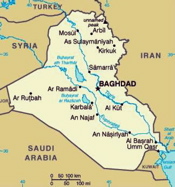Iraqi Shiite politicians and religious leaders are meeting in Najaf this weekend in the hope of overcoming factional differences and reaching agreement on at least a temporary halt in violence by their militias. The key figure in the negotiations is Grand Ayatollah Ali al-Sistani, the influential Shiite spiritual leader who lives in Najaf and who was recently reported to be furious with the record levels of attacks by Shiite Muslim militia and Sunni insurgents. Sistani, who hardly ever makes public pronouncements, was recently reported as calling for a joint effort by Shiites, Sunni, and Kurds to halt Iraq's sectarian strife. According to reports, Iraqi Prime Minister Nouri al-Maliki's Dawa party and Abdul Aziz al-Hakim, the Shiite theologian who heads the Supreme Council for the Islamic Revolution in Iraq (SCIRI) and its Iranian-backed Badr corps militia, have agreed to rein in their militia if Moqtada al-Sadr, who controls the Shiite Mahdi army, will do the same.
Iraqi Shiites to Meet in Najaf to Discuss Factional Differences

